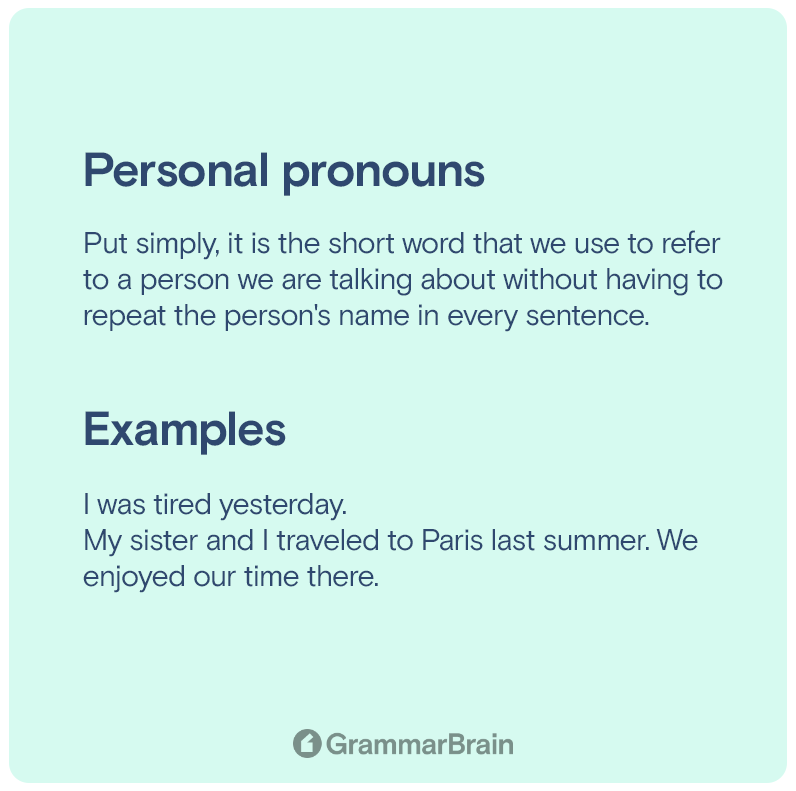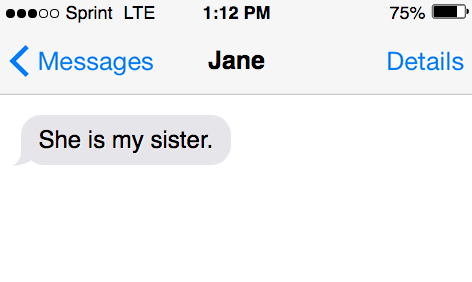What are personal pronouns? And how are they used? In English, personal pronouns are the words we constantly use in our daily communication to refer to a person, a group of people, a thing, or things.
They help in making conversations clear and crisp. The personal pronouns that we use are She, He, I, It, I, you, we, they, me, him, her, us, and them.
Understanding personal pronouns and using them can make our conversations, be they written or spoken, much more accessible and transparent.
By using personal pronouns, we avoid repeating names and, in many cases, we also make the gender of a person straightforward.

What are personal pronouns?
Put simply, it is the short word that we use to refer to a person we are talking about without having to repeat the person’s name in every sentence.
Personal pronouns are used in different forms and contexts.
It’s nearly impossible to have a conversation in English without using personal pronouns in some form or other.

What are first, second, and third-person pronouns?
The first-person pronoun is used by a person or a group of people to refer to himself or herself or themselves. During a conversation, it would be easier to refer to yourself as I, rather than repeat your name every time.
The second-person pronoun refers to the person the speaker is addressing. It can be just one person or a group of people.
The third person refers to someone the speaker is talking about. The person is not around during the conversation.

Examples in sentences
First-person pronoun:
- I was tired yesterday.
As you can see in the above sentences, names are not mentioned. The person listening understands you are talking about yourself
In the above sentence, the first sentence establishes who the conversation is about the word I is the first-person singular pronoun. In the second sentence, the people have been replaced with We (my sister and I).
Second-person pronoun:
- Did you meet the doctor?
In this sentence, the second person pronoun is you, the person you are addressing.
Third-person pronoun:
- My parents visited Paris last summer. They had a good time.
Once again, the word They is used instead of my parents.
| Personal pronouns (subject) | Personal pronouns (object) |
| I | Me |
| You | You |
| He | Him |
| She | Her |
| It | It |
| We | Us |
| You | You |
| They | Them |
What are subject and object pronouns?
Subject pronouns and object pronouns are two of the most important pronouns that are often used in most sentences in the English language.
As the term suggests, subject pronouns refer to the person who is the main subject of a sentence. In other words, the subject pronoun is followed by a verb. Subjective pronouns are also called nominative pronouns.
Object pronouns refer to the person or thing who receives the action (the object in a sentence). Contrary to the subject pronoun, this word is the object of a verb.
While reading a sentence, if you can spot the object of the sentence, it is pretty easy to find the object pronouns.

Examples of person, nominative, and object
Subject Pronoun
- She went home.
In this sentence, She is the subject is followed by the verb went.
Object Pronoun
- The teacher gave her some good advice.
Her is the object pronoun since the action was done to her.
Second person singular vs. plural
The second person singular pronouns are when the second person pronouns are used to refer to one person who is the listener or reader.
On the other hand, the second person plural words are used to refer to a group of listeners or readers. However, for both singular and plural, the words that are used are the same.
The second person singular and plural words are you, your, yours, and yourself. The only way to know if the listener is one person or a group of people is by understanding the context.
For example:
- You need to submit the assignment tomorrow.
A teacher can use the same word You while she is talking to one student and also while she is talking to an entire class.
Singular to “they”
In the third person pronouns, you can distinguish the singular and plural forms using certain words. While referring to a single person or thing, the words used are he, she, and it.
Examples for Second person singular and plural:
- He played well.
- They played well
Regarding the second person singular, the gender is quite clear. However, the word they are neutral. They can be used to refer to a group of men, a group of women, or even a group of people, both men and women.

Are personal pronouns capitalized
The personal pronoun I is always capitalized while other personal pronouns are capitalized only if they are placed as the first word in a sentence.
However, the personal pronoun I is capitalized even if it is in the middle or end of the sentence.
What are the 8 personal pronouns?
In the English language, there are eight personal pronouns that are used quite commonly in our day-to-day sentences. They are I, you, he, she, it, we, they, me, him, her, us, them.
Examples in sentences
Here are examples of every personal pronoun.
- I am visiting my parents this summer.
- You will receive an email tonight.
- He had a good time.
- She is my sister.
- It needs to be washed.
- We are going home.
- They are leaving the building now.
- You can come with me to the airport. (In this sentence, You is the subject pronoun and the object pronoun me is the object pronoun)
- They met him last year
- They gave her a present
- They gave us a bottle of wine.
- We met them at the hotel.
Should personal pronouns be used in an essay?
The word You can be avoided since the person reading is someone the writer does not know.
The third person pronouns are used in academic essays since it is more formal.
For example, It is hot today is more appropriate than I think it’s hot.
When writing an essay, especially an academic one, it is best to avoid using personal pronouns such as I, you, and me. An essay is obviously the writer’s analysis, so reiterating this is not always required. The personal pronoun I is used only when the writer needs to share a personal opinion. This is subjective and purely based on the writer’s experience and feelings.
More on pronouns
More resources on pronouns:
Sources
- Personal Pronouns | Explore Definition, Usage and Examples
- Second Person: Explanation and Examples – Grammar Monster
- Finding proper pronouns
Inside this article
Fact checked:
Content is rigorously reviewed by a team of qualified and experienced fact checkers. Fact checkers review articles for factual accuracy, relevance, and timeliness. Learn more.
Core lessons
Glossary
- Abstract Noun
- Accusative Case
- Anecdote
- Antonym
- Active Sentence
- Adverb
- Adjective
- Allegory
- Alliteration
- Adjective Clause
- Adjective Phrase
- Ampersand
- Anastrophe
- Adverbial Clause
- Appositive Phrase
- Clause
- Compound Adjective
- Complex Sentence
- Compound Words
- Compound Predicate
- Common Noun
- Comparative Adjective
- Comparative and Superlative
- Compound Noun
- Compound Subject
- Compound Sentence
- Copular Verb
- Collective Noun
- Colloquialism
- Conciseness
- Consonance
- Conditional
- Concrete Noun
- Conjunction
- Conjugation
- Conditional Sentence
- Comma Splice
- Correlative Conjunction
- Coordinating Conjunction
- Coordinate Adjective
- Cumulative Adjective
- Dative Case
- Determiner
- Declarative Sentence
- Declarative Statement
- Direct Object Pronoun
- Direct Object
- Diction
- Diphthong
- Dangling Modifier
- Demonstrative Pronoun
- Demonstrative Adjective
- Direct Characterization
- Definite Article
- Doublespeak
- False Dilemma Fallacy
- Future Perfect Progressive
- Future Simple
- Future Perfect Continuous
- Future Perfect
- First Conditional
- Irregular Adjective
- Irregular Verb
- Imperative Sentence
- Indefinite Article
- Intransitive Verb
- Introductory Phrase
- Indefinite Pronoun
- Indirect Characterization
- Interrogative Sentence
- Intensive Pronoun
- Inanimate Object
- Indefinite Tense
- Infinitive Phrase
- Interjection
- Intensifier
- Infinitive
- Indicative Mood
- Participle
- Parallelism
- Prepositional Phrase
- Past Simple Tense
- Past Continuous Tense
- Past Perfect Tense
- Past Progressive Tense
- Present Simple Tense
- Present Perfect Tense
- Personal Pronoun
- Personification
- Persuasive Writing
- Parallel Structure
- Phrasal Verb
- Predicate Adjective
- Predicate Nominative
- Phonetic Language
- Plural Noun
- Punctuation
- Punctuation Marks
- Preposition
- Preposition of Place
- Parts of Speech
- Possessive Adjective
- Possessive Determiner
- Possessive Case
- Possessive Noun
- Proper Adjective
- Proper Noun
- Present Participle
- Prefix
- Predicate



